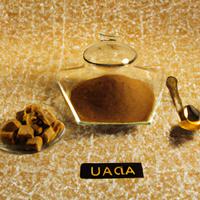
1 serving (4 grams) contains 15 calories, 0.0 grams of protein, 0.0 grams of fat, and 3.9 grams of carbohydrates.

Log this food in SnapCalorie

Nutrition Information
Calories |
760 | ||
|---|---|---|---|
% Daily Value* |
|||
| Total Fat | 0 g | 0% | |
| Saturated Fat | 0 g | 0% | |
| Polyunsaturated Fat | 0 g | ||
| Cholesterol | 0 mg | 0% | |
| Sodium | 80 mg | 3% | |
| Total Carbohydrates | 196 g | 71% | |
| Dietary Fiber | 0 g | 0% | |
| Sugars | 194 g | ||
| protein | 0 g | 0% | |
| Vitamin D | 0 mcg | 0% | |
| Calcium | 170 mg | 13% | |
| Iron | 1 mg | 5% | |
| Potassium | 200 mg | 4% | |
* Percent Daily Values are based on a 2,000 calorie diet. Your daily values may be higher or lower depending on your calorie needs.
Food Attributes
Source of Calories
About Muscovado sugar
Muscovado sugar, also known as "barbados sugar," is an unrefined sugar with a deep, molasses-like flavor and moist texture. It originates from sugarcane juice, which is boiled and minimally processed, retaining more minerals like calcium, potassium, iron, and magnesium compared to refined sugars. Commonly found in traditional Caribbean, Indian, and Southeast Asian cuisines, muscovado sugar adds a rich depth to baked goods, marinades, and beverages. While its trace minerals provide a slight nutritional edge over white sugar, muscovado is still high in calories and should be consumed in moderation. It’s prized for its natural, robust flavor but lacks the uniform sweetness of refined sugars, making it a favorite for those seeking less-processed ingredients in their cooking. However, like all sugars, excessive consumption can contribute to health issues like weight gain and elevated blood sugar levels.



